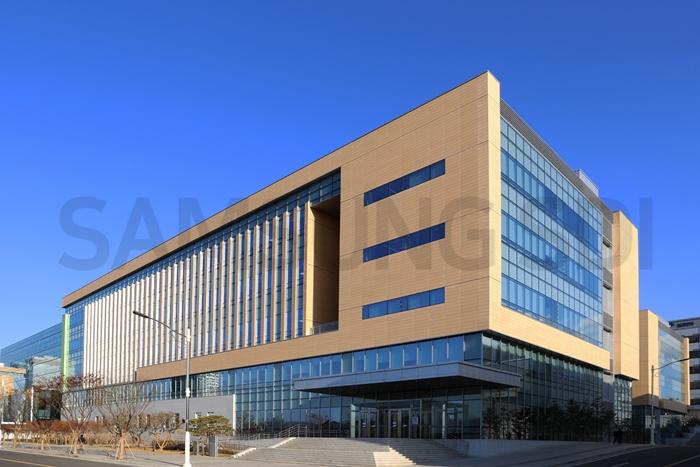Batteries
Samsung SDI to run all-solid-state battery pilot line
Samsung plans to begin mass production of the so-called 'Dream Battery' from 2027, using sulfide solid electrolytes
By Mar 15, 2022 (Gmt+09:00)
3
Min read
Most Read
LG Chem to sell water filter business to Glenwood PE for $692 million


Kyobo Life poised to buy Japan’s SBI Group-owned savings bank


KT&G eyes overseas M&A after rejecting activist fund's offer


StockX in merger talks with Naver’s online reseller Kream


Mirae Asset to be named Korea Post’s core real estate fund operator



Samsung SDI Co. is poised to become one of the few electric vehicle battery manufacturers in the world to run a pilot production line of all-solid-state batteries. On Monday, it broke ground for the pre-commercial line of solid-state cells within its research complex in Suwon, 34 kilometers south of Seoul.
The South Korean company plans to begin mass production of the next-generation battery around 2027, about three years ahead of its domestic rivals -- LG Energy Solution Ltd. and SK On Co.
It dubbed the facility under construction "S-Line," saying the letter S comes from three words of solid, sole and Samsung SDI, according to its statement.
"The new S-Line will be the stepping stone to make Samsung SDI as the true No.1 company with 'super-gap' technological competitiveness, superior quality and qualitative growth that prioritizes profitability," the company's Chief Executive Choi Yoon-ho said during the ground-breaking ceremony.
The pilot assembly line, spanning 6,500 square meters, will adopt a new production method and infrastructure to assemble cells designed to allow ions to move smoothly inside a battery, it said in the statement.
Once the facility is completed, Samsung will be able to produce solid-state cells in quantity for testing purposes, which is expected to speed up its development on the so-called "Dream Battery," ahead of its rivals at home and abroad.
All-solid-state batteries have no separator placed between the cathode and the anode and are made out of solid electrolytes that contain ions. By contrast, lithium-ion batteries use liquid electrolytes, which allow lithium-ions to move between the cathode and the anode on the opposite side of a separator.
By eliminating the flammable electrolyte solution used in lithium-ion batteries, solid-state cells are considered safer and more durable than existing ones, alongside faster charging times.
BATTERIES MADE OF SULFIDE ELECTROLYTES
According to industry insiders, Samsung SDI is developing solid-state batteries made of sulfide solid electrolytes, on which it has already secured the relevant technologies and patents.
Compared with polymer- and oxide-based solid electrolytes, batteries using sulfide electrolytes are deemed more appropriate for mass production and boast faster charging times.
Samsung is understood to be in the verification phases for the technologies. It plans to complete the technology verification for small-sized cells by 2023 and for medium- and large-sized cells by 2025, before launching their mass production.
If it goes as planned, Samsung will be three years ahead of two local rivals -- LG Energy Solution Ltd. and SK On Co., which are aiming for commercial production of solid-state batteries around 2030.
"Breaking ground for the pilot line means Samsung SDI has overcome technical challenges for the commercial production of (all-solid-state batteries) and now it is in the testing stages before its mass production," said one of the industry insiders.
To begin mass production, the industry needs to solve technical issues such as charging in a low-temperature environment and improving the electrical conductivity of electrolytes. It is also key to lower the prices of solid electrolytes.

BATTERY STARTUPS
Among battery startups, QuantumeScape backed by Volkswagen is preparing to mass produce solid-state battery cells between 2024 and 2025.
Solid Power Inc., which has received funding from BMW and Ford Motor Co., has announced a plan to unveil all-solid-state cells in 2025.
SES Holdings Pte. Ltd., backed by Hyundai Motor Co. and General Motors Co., is aiming to commercialize lithium-metal batteries by 2025.
According to SNE Research, the combined capacity of solid-state batteries, or the total amount of electricity generated, is forecast to grow to 16 Gigawatt hours (GWh) by 2025. By 2030, their combined capacity will likely increase to 135 GWh by 2030, meeting 4% of the total demand for EV batteries.
On Monday, POSCO Group said it has started the construction of the world’s largest facility to manufacture solid electrolytes, which is scheduled to begin production in the second half of this year.
On the same day, SK On announced a tentative agreement with Ford and Turkey’s investment holding company Koç Holding AS, to set up a joint venture to produce electric vehicle batteries in Turkey. The venture will have an annual capacity of 30-45 GWh, according to SK.
Write to Hyung-Kyu Kim at khk@hankyung.com
Yeonhee Kim edited this article.
More to Read
-
 BatteriesPOSCO to build largest solid electrolyte plant for batteries
BatteriesPOSCO to build largest solid electrolyte plant for batteriesMar 15, 2022 (Gmt+09:00)
2 Min read -

-
 BatteriesLG Energy develops safer, long-lasting solid-state battery technology
BatteriesLG Energy develops safer, long-lasting solid-state battery technologySep 24, 2021 (Gmt+09:00)
2 Min read
Comment 0
LOG IN


